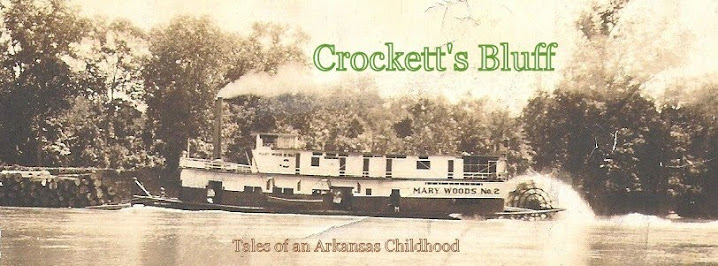Crockett's Bluff Elementary: 1942?
Front Row L/R: Bud (Albin) Anderson, Donald Inman, Charles Dupslaff, Len Prange, August Prange, and Henry Gammon. Second Row: John Kemp, Connor Kemp, W.C. Inman, Neva (Graves) West, Sharon (Bullock) Rush, Louise Hill, Margaret Dallas, and Beulah Ward. Third Row: Joy Simpson, Joan Dobson, Evelyn (Rush) Meins, Lorene (Hill) Harris, Bettye (Anderson) Widener, Elnora (Bullock) Graves, Mary Helen Newman, John Knight. Top: Mrs. Harry Barnard, teacher.
Eighth Grade: Crockett's Bluff School, 1942
Front Row L/R: Charles Prange, Bill Woodiel, Erlene Inman, Leroy Knight, and O.V. Gosnell. Top Row: Duke Trice (teacher), Boone Bullock, Wilmer Hill, and Dallas Dobson
Crockett's Bluff 4-H Club Members 1942-43
Front Row L/R: Betty (Anderson) Widener, Lorene (Hill) Harris, Betty Ann Prange, Frances Inman, Virginia Kemp, Irene (Hill) Schorstein, Twila May Dallas and Ida Carolyn (Prange) Williams. Second Row: Charles Prange, Pete Dobson, Mary Helen Newman, Elnora (Bullock ) Graves, Erlene Inman, Willene Graves West, Juanita (Dallas) Mitchel, Shelby Woodiel, Harold Rush, and Mrs. Cora Prange Swindler, School Board Representative. Back Row: Duke Trice, Principal and Teacher, George Sorrels, County Extension Agent, O.V. Gosnell, Dallas Dobson, Leroy Knight, Boone Bullock, Wilmer Hill, Billy Woodiel, Christine Naughter, Home Demonstration Agent, Lewis Rush, and Mrs. Bertha Barnard, teacher.
[For an enlarged view, just click on a picture. I have Sharon (Bullock) Rush to thank for these three pictures. Those of the elementary class and the 4-H Club Nere previously provided by the late Elnora (Bullock) Graves for publication in the DeWitt Era Enterprise. DPW]
[These three pictures appear to have been taken on the same day or at the same setting. My brother Bill (pictured above) confirms my sense that they could not have been taken in 1942, as noted by the DeWitt Era Enterprise, but at least as early as 1940 or the spring of 1941, because we both recall living in DeWitt and attending schools there on Pearl Harbor Day, December 7, 1941. DPW 3.17.10]
[These three pictures appear to have been taken on the same day or at the same setting. My brother Bill (pictured above) confirms my sense that they could not have been taken in 1942, as noted by the DeWitt Era Enterprise, but at least as early as 1940 or the spring of 1941, because we both recall living in DeWitt and attending schools there on Pearl Harbor Day, December 7, 1941. DPW 3.17.10]





